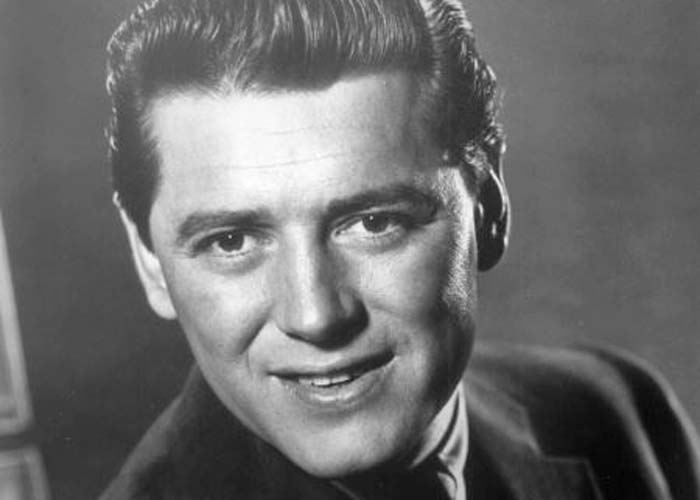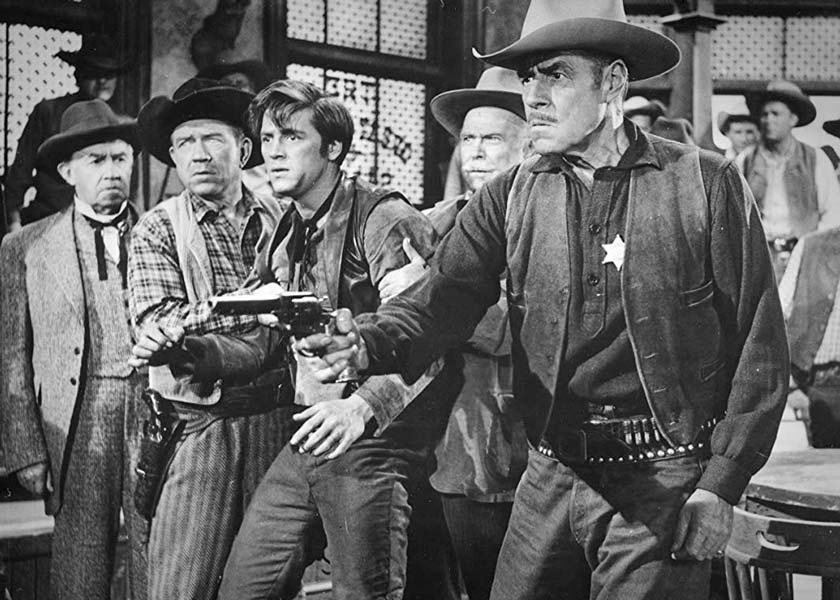Synopsis
Identified only by his clothes and horse, Logan Barrett (MacRae), son of Sheriff Sam Barrett (Holt), is arrested for murder and bank robbery. With the assistance of Larrabee (Calhoun), he escapes jail. Shot and treated by Dr. J.A. Martin (Raymond Bond), he kidnaps the Doctor's niece, Janie (London), and flees into the hills.
Hiding out from the posse led by Sheriff Barrett, Logan and Janie witness a stagecoach robbery in which one of the robbers is dressed exactly like Logan and riding a similar pinto horse. Logan realizes that Larrabee had helped him escape jail to get him out of the way during the masquerade that framed him for the crimes. Logan pursues Larrabee who gets away and unites with his gang. Logan joins Sheriff Barrett's posse, and they capture the entire gang after a shoot out and a fist fight between Logan and Larrabee. Cleared of all charges, Logan takes Janie for a buggy ride.
Discussion
Return of the Frontiersman is an enjoyable low-budget Western with a rather conventional plot, capable dialogue, and plenty of fist fights, bank and stagecoach robberies, and horseback chases. Gordon MacRae, pleasant and wholesome, makes a surprisingly solid Westerner. He looks comfortable in Western outfits and on a horse and handles the action acceptably. His presence carries the film and makes it fun. Julie London has little to do except provide feminine good looks and some mild romance. The direction and camerawork are straightforward and serviceable. The meaningless title has little association with the story or action. As was often the case with low-budget Westerns, loud generic music plays during the chase scenes. Intended to pump up the action, the music is repetitive and tiresome.

A singer and actor, MacRae was appearing in a review on Broadway in 1946 when he signed with Warner Bros. He alternated roles in musical comedies and non-musical dramas during his first couple of years with the studio, before settling full-time into musicals. Return of the Frontiersman was MacRae's fifth film and his only Western. He sings two short songs while in jail. After this film, MacRae stayed in musical comedy. He made four films with Doris Day and three adaptations of Broadway hits: The Desert Song (1953), Oklahoma (1953) and Carousel (1956). After his film career ended rather abruptly in the mid-1950s when production of movie musicals waned, MacRae toured in musical comedy and starred in summer stock. He appeared with his wife Sheila on television, in nightclubs, and in concert.
In contrast to MacRae's relatively short film career, Rory Calhoun was active in films and on television for nearly fifty years, accumulating a filmography of eighty films and hundreds of television programs from 1944 to 1993. Calhoun was one of the most active cowboy stars of the 1950s and 1960s.
Richard L. Bare spent most of his career directing short films. Starting in 1942, he wrote and directed dozens of Warner Bros. shorts in a series titled So You Want To…, starring comedian George O'Hanlon as a character named Joe McDoakes who comically demonstrates what happens when you want to do something, such as be a detective or play the piano. The final entry in the series, So Your Wife Wants to Work, was released in 1956. Bare also directed several low-budget features in association with producer Saul Elkins, including Return of the Frontiersman, although feature-length films apparently did not suit Bare; in 1950, his contract with the studio was adjusted, and he returned to directing shorts exclusively. With his extensive experience, Bare had no difficulty moving to television. He directed hundreds of episodes of several series, including Petticoat Junction, Route 66, The Twilight Zone, Maverick, nearly every episode of Green Acres (1965-71), and many others. Bare is also credited with the discovery of star actor James Garner. He died in 2015, age 101.

